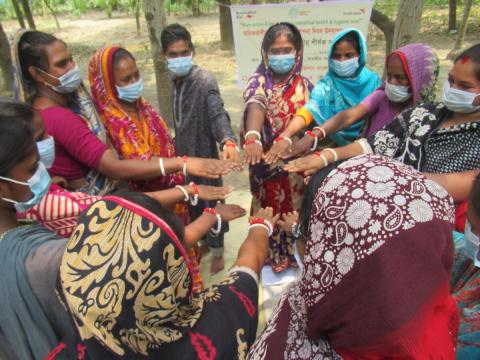
Changing the power dynamics: Gender-transformative social accountability
As Sarah Onduko and Abigail Howe-Will prepare for the Women Deliver 2023 conference in Kigali, Rwanda they reflect on the success of a recent project with World Vision Bangladesh that led to transforming the lives of women and girls with disabilities and others facing social marginalization.
14 July 2023
Social accountability and inclusion
Gender equality and women’s and girls’ empowerment have been development concerns for a number of decades, with governments, communities, organisations and individuals working together to increase the well-being and rights of women and girls in societies. It is now expected that development activities will identify and meet the different barriers that women and girls face to ensure programmes meet their specific needs.
However, over the years, women and girls and others who champion their rights are highlighting that just meeting their needs is not enough. More people, communities, organisations and governments are seeking to create spaces where women and girls can meaningfully participate, have their voices heard and improve their positions in society.
World Vision’s social accountability approach, Citizen Voice and Action (CVA), seeks to create these kinds of spaces. Citizen Voice and Action has empowered communities across 44 countries to hold their governments accountable for services promised to them. It creates a space for community members to influence their governments and to advocate for their rights. The process intentionally includes individuals from groups that are marginalised from decision-making and participation in places of power. It also creates a space where citizens can speak to and influence leaders. CVA can empower and transform women, men, people with disabilities, and other marginalised groups to lead gender-transformative social accountability
What does this look like in practice?
Let’s look to World Vision Bangladesh to see this in action: specifically, the Strengthening Gender Equality and Social Inclusion in WASH (SHOMOTA) project.
The implementation of SHOMOTA was accompanied by a three-year research project to learn from and inform the project’s approach, which was led by the University of Technology Sydney. The research explored how gender-transformative social accountability can strengthen the capacity of civil society organisations, government and communities in planning, investing and delivering sustainable water, sanitation and hygiene services that meet the needs of diverse groups of people.
What did the research find?
The outcome assessment found gender-transformative social accountability approach increased agency of women and people living with a disability, especially to participate and engage in decision-making in WASH governance; it also influenced equitable gender relations in households, at the community level, and between government officials and women and people with disabilities in formal governance structures.
How does this relate to Women Deliver?
This week, 6,000 participants from around the world are gathering at Women Deliver 2023 in Kigali, Rwanda to promote gender equality, focusing on transforming the position of women and girls in society. The event seeks to fostering solidarity for sustainable solutions and hold leaders accountable to deliver on gender equality outcomes.
Social accountability approaches like Citizen Voice and Action can be effective tools to meet the needs of women and girls. But they can go much further than this, especially when they are intentionally designed to transform power dynamics. As the SHOMOTA case study demonstrates, social accountability approaches also can amplify the voices of women and girls.
They can address power relations that often exclude women and girls from private and public decision-making spaces. They can support women and girls, including those with disabilities, to gain power to influence government and receive services to which they are entitled. These transformed dynamics build a foundation for sustainable change.
Learn more by watching the Shomota video here.
Sarah Onduko-Obiri, holds the role of global Governance and Social Accountability Advisor with WVI. She has over 14 years experience in governance and public policy provides technical advice to World Vision’s governance and social accountability programs, focusing on innovation and adaptations, DMEAL, Knowledge management and building evidence for impact.
Abigail Howe-Will is World Vision's Gender Equality and Social Inclusion Technical Director. She is a passionate GESI specialist with 16 years' experience in peacebuilding, violence prevention and women’s and girls’ empowerment work in the US, Philippines, Timor-Leste and Melanesia.
SHOMOTA is implemented by World Vision Bangladesh, in an academic-NGO partnership with the Institute for Sustainable Futures, University of Technology Sydney, and the University of Rajshahi. The research project is funded by The Water for Women Fund, an initiative of the Department of Foreign Affairs and Trade being delivered as part of Australia’s Aid Program.

